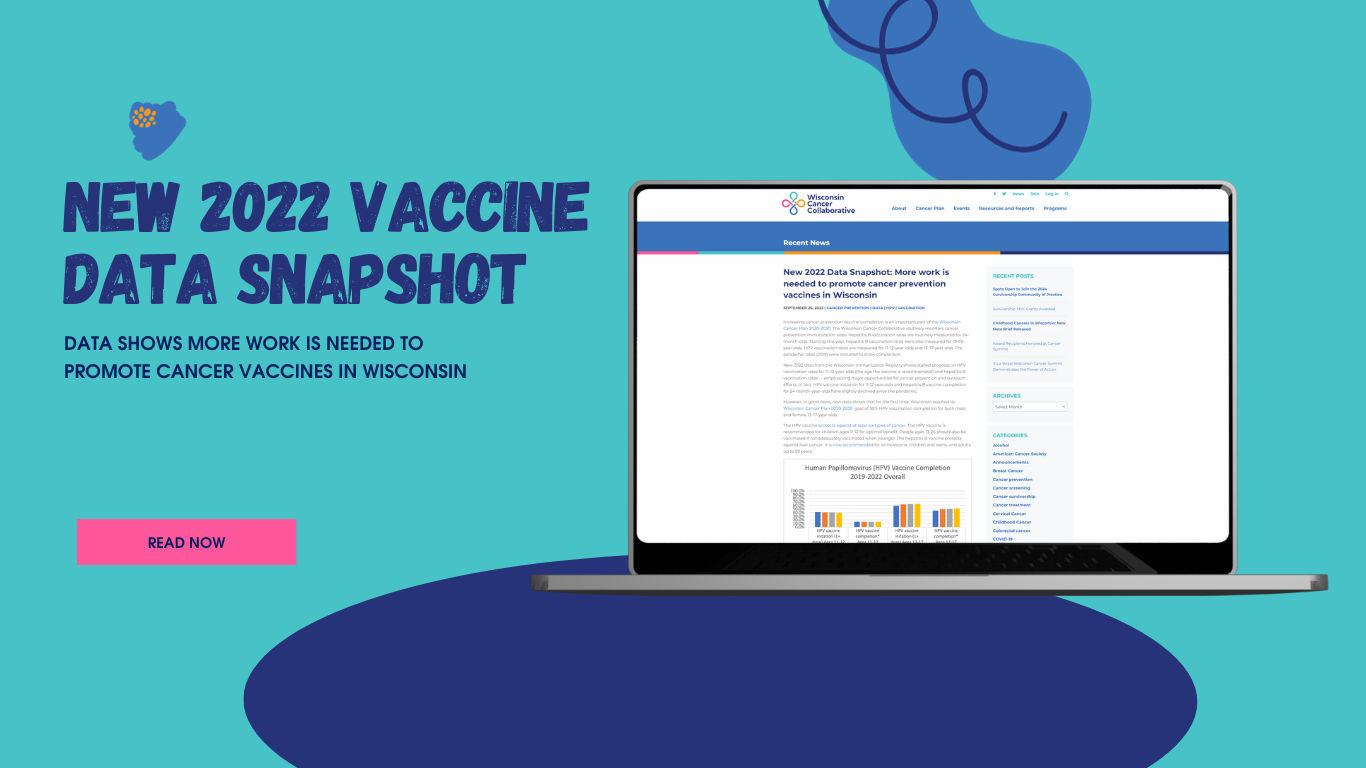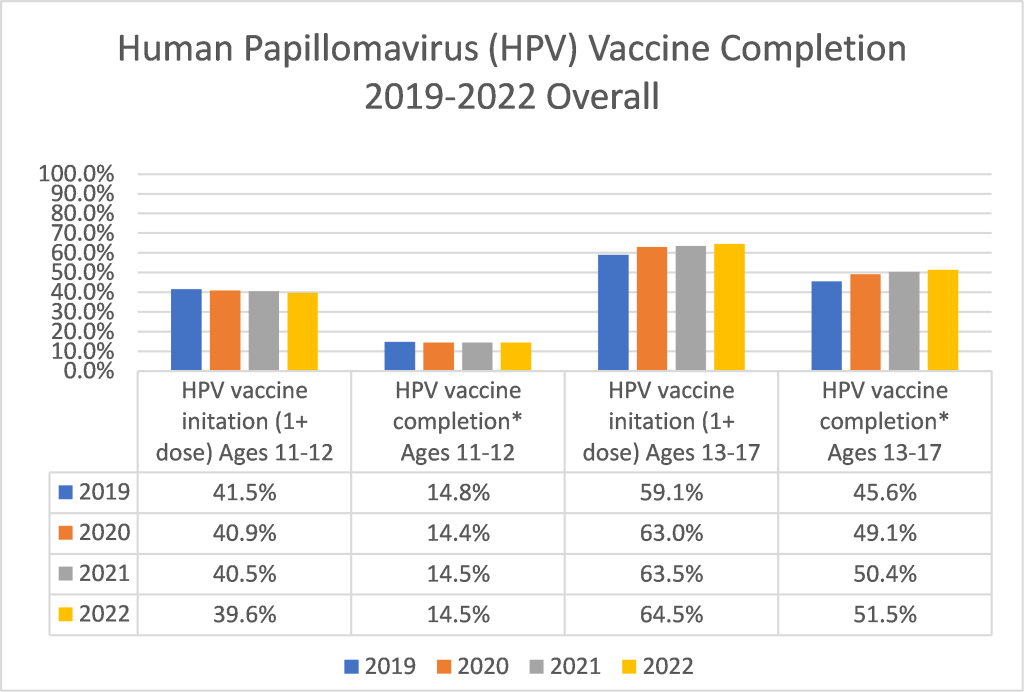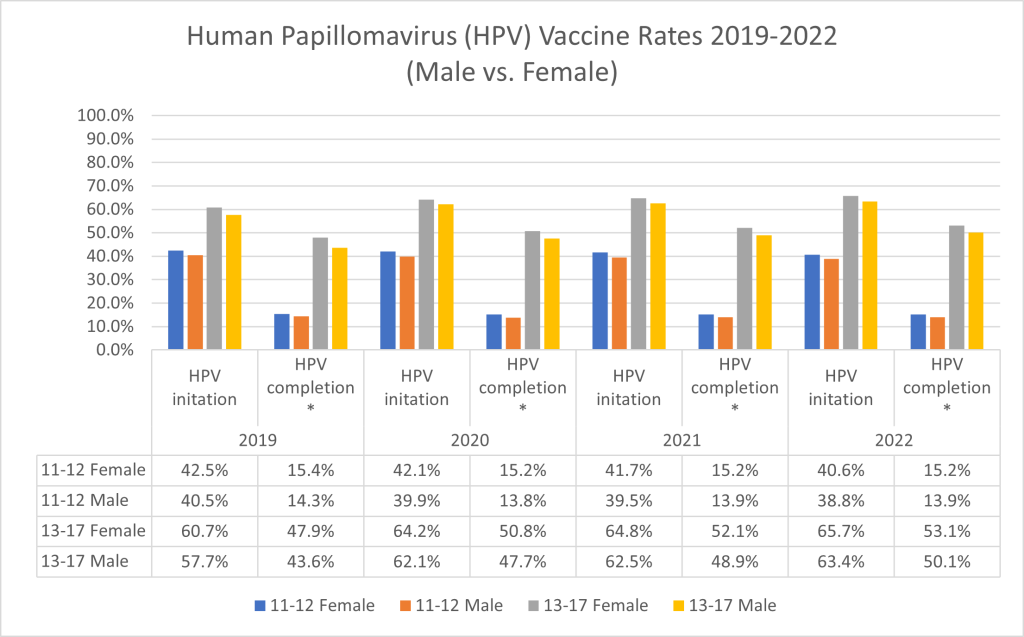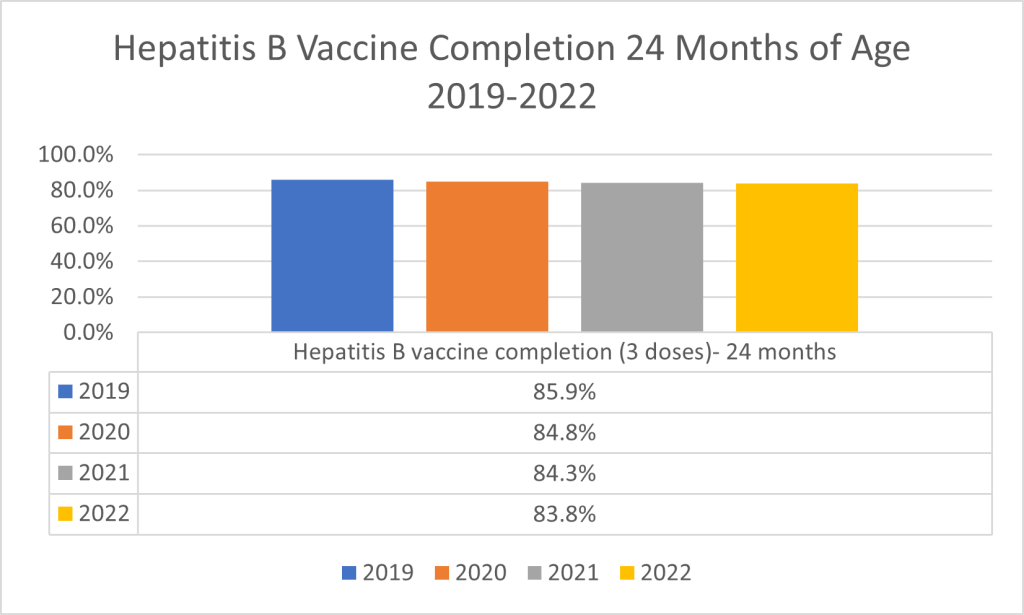
Increasing cancer prevention vaccine completion is an important part of the Wisconsin Cancer Plan 2020-2030. The Wisconsin Cancer Collaborative routinely monitors cancer prevention immunization rates. Hepatitis B vaccination rates are routinely measured for 24-month-olds. Starting this year, hepatitis B vaccination rates were also measured for 19-59-year-olds. HPV vaccination rates are measured for 11–12-year-olds and 13–17-year-olds. Pre-pandemic rates (2019) were included to show comparison.
New 2022 data from the Wisconsin Immunization Registry shows stalled progress on HPV vaccination rates for 11–12-year-olds (the age the vaccine is recommended) and hepatitis B vaccination rates — emphasizing major opportunities for cancer prevention and outreach efforts. In fact, HPV vaccine initiation for 11-12 year-olds and hepatitis B vaccine completion for 24 month-year-olds have slightly declined since the pandemic.
However, in good news, new data shows that for the first time, Wisconsin reached its Wisconsin Cancer Plan 2020-2030 goal of 50% HPV vaccination completion for both male and female 13–17-year-olds.
The HPV vaccine protects against at least six types of cancer. The HPV vaccine is recommended for children ages 11-12 for optimal benefit. People ages 13-26 should also be vaccinated if not adequately vaccinated when younger. The hepatitis B vaccine protects against liver cancer. It is now recommended for all newborns, children and teens, and adults up to 59 years.

Other key findings include:
- Wisconsin is reaching its goal of 50% HPV vaccine completion for both 13–17-year-old males and females! For reference, the Wisconsin Cancer Plan’s baseline measure (2017) for males was 35%, and as of 2022, males 13-17 had an HPV vaccine completion rate of 50.1%. The Wisconsin Cancer Plan’s baseline measure (2017) for females was 42%, and as of 2022, females 13-17 had an HPV vaccine completion rate of 53.1%.
- The gap in HPV vaccination rates between females and males has been narrowing.
- Vaccine rates vary by county.
- Hepatitis B
- In 2022, hepatitis B vaccination completion rates for 24 month-olds were highest in Door, Calumet, and Green counties and lowest in Pepin, Clark, and Vernon counties.
- HPV
- In 2022, HPV vaccination completion rates for 11–12-year-olds were highest for Dane, Green and Eau Claire counties and lowest for Florence, Forest, and Menominee counties.
- In 2022, HPV vaccination completion rates for 13-17-years-olds were highest in La Crosse, Dane and Eau Claire counties and lowest in Grant, Burnett, and Florence counties.
- In 2022, La Crosse county had the highest vaccine initiation rate for 11-12 year olds (53.4%) and Menominee county has the highest initiation rates for HPV vaccination for 13-17 year olds (74.4%).
- Hepatitis B
- Hepatitis B vaccine completion rates for 24-month-olds fell by 0.5% compared to last year and has declined 2.1% since pre-pandemic 2019 rates.
- In 2022, hepatitis B vaccination rates for 19-59 year-olds started being measured in response to the new universal hepatitis b vaccination recommendation. In 2022, the hepatitis B initiation rates for 19-59 year-olds was 48.5% and the hepatitis B completion rates were 42.0%.
See how the data compare:


Learn more and take action:
- Learn more about HPV-related cancers in Wisconsin and factors that influence immunization in our issue brief, HPV-Related Cancers and Vaccination.
- Visit the Wisconsin Immunization Program website to look at data from your county.
- Review the evidence summary on HPV vaccination for children ages 9-12, from the National HPV Vaccination Roundtable.
- Use these resources from the National HPV Vaccination Roundtable to help normalize HPV vaccination at age 9.
- Use these hepatitis B resources from the Centers for Disease Control and Prevention.
- Universally vaccinate all eligible adults ages 19-59 with hepatitis B vaccine according to these recommendations.
- Routinely vaccinate all people ages 11-26 with the HPV vaccine; consider providing the vaccine as early as age 9.
- For adults ages 27 through 45 years, HPV vaccination can be considered based on shared decision making.
Please contact us to learn how to promote cancer prevention vaccines in your community.
Thank you to the Wisconsin Department of Health Services Wisconsin Immunization Program for providing the input and data needed for this update.
Thank you to all who promote and provide vaccinations to help prevent cancer in Wisconsin.
